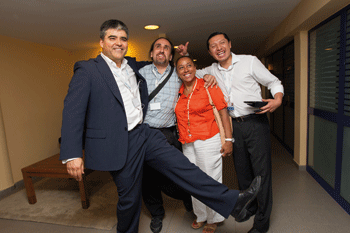
What the Marrakesh treaty means for blind people
By Dan Pescod, Vice Chair of the Right to Read Campaign, World Blind Union (WBU)
As Vice Chair of the World Blind Union's Right to Read Campaign, I have been participating in meetings of WIPO's Standing Committee on Copyright and Related Rights (SCCR) for the past eight years. For the past five, I have coordinated WBU's day-to-day campaigning for what will now be known as the Marrakesh Treaty, working with our Chairs - Chris Friend and then Maryanne Diamond. Our campaign for this treaty became more a way of life than a job.
I know I speak for all my colleagues when I say that we found the Marrakesh Diplomatic Conference, and most especially its outcome, to be momentous, historic, emotional, and scarcely believable. The much-used tag "Miracle of Marrakesh " is indeed apt.

Making a practical difference
WBU feels we have the treaty we sought; one that will really make a practical difference to the lives of millions of blind and print disabled people.
Many said the treaty would never happen. Some said it was not worth pursuing, arguing that in itself it would not end the book famine. I can confirm that it will not end the book famine. The treaty, though a great and important achievement, is just one part of the larger jigsaw puzzle of full accessibility. But we cannot omit a piece of a jigsaw on the grounds that it will not solve the whole puzzle. Without this vital piece- the treaty- the puzzle could never be complete.

These past five years, WBU has heard much of rightholders' fears about the possible consequences of this treaty for them. It is, after all, the first intellectual property (IP) treaty with the explicit objective to improve access for users, rather than to protect the interests of rightholders. WBU never took these concerns lightly. We are certain, however, that in reality this treaty will not damage those interests. We are very confident that if publishers publish accessible books in affordable mainstream formats, blind and print disabled people will buy them or borrow them from mainstream libraries, just as other customers do. To that end, WBU intends to continue to work with publishers to help them achieve a world where mainstream accessible publishing is the norm.
The treaty will open up a world of possibilities for organizations like the Royal National Institute of Blind People (RNIB) in the United Kingdom (UK) to make books accessible and share them across international borders with those who need them most. Even in countries where the print disabled community is relatively well provided for, such as the UK, visually impaired people will be able to receive many more accessible format titles thanks to the treaty's provisions. For instance, at present, Bookshare.org in the USA can only send blind subscribers in the UK some 75,000 of its 200,000 books. With the treaty, it should be able to send us the remaining 125,000 titles at the click of a button.
Transforming lives
Moreover, in developing countries, where the vast majority of the world's visually impaired people live, the treaty should allow us to transform lives. For example, in Marrakesh I met a talented and multilingual blind Moroccan lady who has put her decision to pursue a doctorate on hold due to a lack of accessible books for her studies. Widespread ratification of the Treaty would mean that there is every chance that she will receive the books she needs for her studies, in accessible formats from existing collections. The treaty promises to create a life-changing opportunity for this young woman and many like her, to study, have a career, and fully use her considerable talents.
What now?
- WBU's Right to Read Campaign continues. We need to ensure ratification not just by 20 countries so that the treaty enters into force, but by all countries so that borders no longer pose barriers to accessible books.
- We need to explain to blind and print disabled people, and their organizations, what the treaty means for them.
- We need to build the capacity of blind people's organizations and other bodies serving blind people all round the world to ensure they are able to take advantage of the opportunities this treaty creates to share books.
- We need to continue to work with DAISY, EDItEUR and other organizations which help to make digital books accessible.
- Not least, we need to work with publishers and other rightholders, to help them publish accessibly from the word "go ".
- We have some more years of hard work in front of us before the right to read of blind and print disabled people is achieved in full. Marrakesh, though, was a real leap forward, removing the barriers to access inherent in copyright law.
- At Marrakesh, the international community also sent a strong message that now is the time to take clear action to really, truly, end the book famine. What a wonderful thing to be part of!
- The treaty may not have been the end of the book famine, but to misquote Sir Winston Churchill, it signals the "beginning of the end ". WBU looks forward to working with disabled people and their organizations, with WIPO, rightholders, and all others who can help finish the job.
The WIPO Magazine is intended to help broaden public understanding of intellectual property and of WIPO’s work, and is not an official document of WIPO. The designations employed and the presentation of material throughout this publication do not imply the expression of any opinion whatsoever on the part of WIPO concerning the legal status of any country, territory or area or of its authorities, or concerning the delimitation of its frontiers or boundaries. This publication is not intended to reflect the views of the Member States or the WIPO Secretariat. The mention of specific companies or products of manufacturers does not imply that they are endorsed or recommended by WIPO in preference to others of a similar nature that are not mentioned.